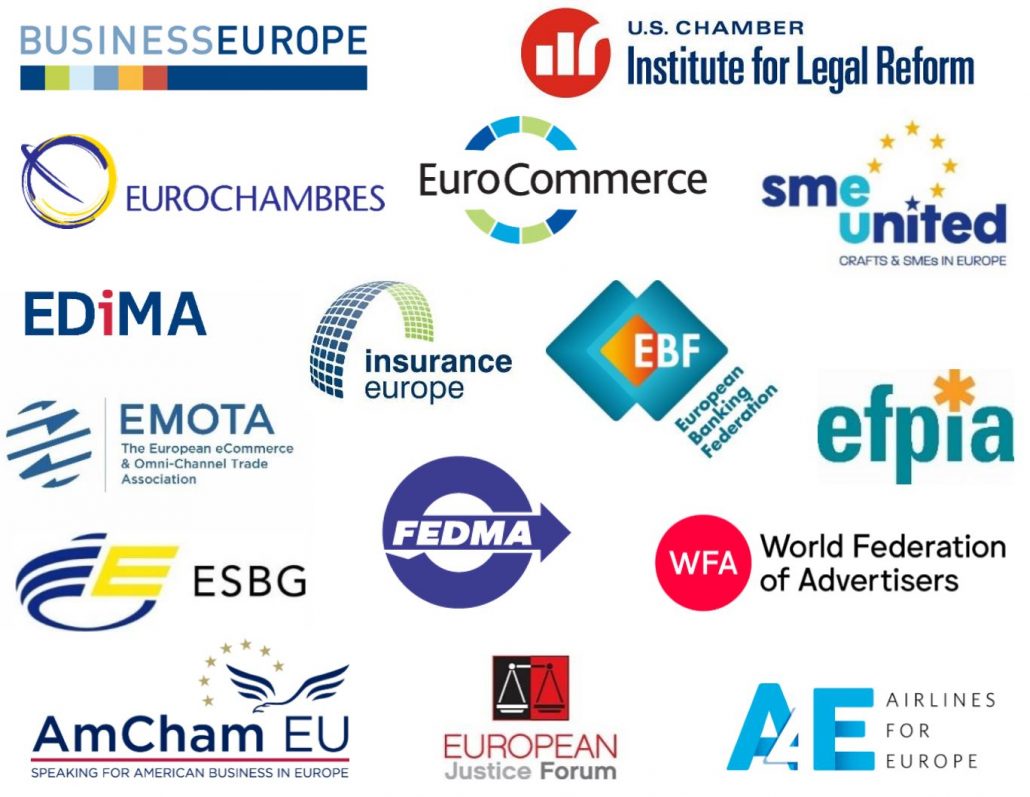
Brussels, 30 November 2018
Our organisations support fair and balanced civil justice systems with effective enforcement of consumers’ rights. We have, however, genuine concerns regarding the ability of the Commission’s original proposal to deliver on these goals. It is a concern shared by industry in a significant number of Member States and sectors, even in countries that already have in place collective redress instruments.
We acknowledge and welcome the efforts made in both the draft report and the amendments under discussion to bring legal clarity to some of the elements of the proposal. The amendments currently being considered include some improvements, but there remain important flaws. Given the complexity of the proposal and the many open questions, it is essential for the European Parliament Legal Affairs Committee (JURI) to use caution and take the time needed to reflect and identify the most effective solutions.
In this context, the business community would like to put forward its key priorities/concerns ahead of the JURI Committee vote:
1. Need for further procedural safeguards
The proposal contains problematic features and loopholes that would lead to unnecessary and wasteful litigation in Europe. The proposal should not provide incentives to competitors, third-party investors and law firms to litigate against companies at the expense of consumers. It is imperative that the JURI Committee assesses and mitigates these risks.
We welcome the efforts made to strengthen principles such as the loser pays rule; the prohibition of punitive damages; and the admissibility criteria for compensation claims.
However, these important safeguards must be applicable to all collective claims, and not just to a sub-set of claims (such as third-party funded claims).
The text is still missing safeguards that need to be clearly stated, and which should apply to all claims. They include, for example:
– Prohibition of contingency fees (where fees for lawyers, claims collection vehicles or third-party litigation funders are calculated as a percentage of amounts awarded); – Joint and several liability of third-party funders for adverse cost orders; – Prevention of overlapping claims; and – Requirement of consumer mandates to initiate collective claims – also known as the opt-in principle.
These and other safeguards serve the purpose of balancing the interests of claimants and defendants and ensuring that compensation truly reaches the affected consumers.
2. Qualified entities
Due to their central role, the criteria to become a qualified entity are among the most important elements of this proposal. They are set to avoid abuses and even fraud. Appropriate criteria must apply equally to all qualified entities, including those entities already certified under pre-existing national representative actions laws.
Weak EU-level criteria would undermine those Member States’ legal systems that already provide stricter criteria to become a qualified entity. We strongly suggest additional common criteria applicable, inter alia, around:
– Proof of stability/seriousness (e.g., minimum number of years of existence) and sufficient human, legal and financial resources and expertise; – Governance that allows for independence and is geared towards the protection of consumer’s interests; – Transparency for court and defendant in contractual relations of the qualified entity with funders/law firms as well as on its activities of legal representation; – Transparency on successes of representative litigation outcomes and distribution of awards to consumers affected, and – Prevention of conflicts of interest.
The EU Alternative Dispute Resolution Directive from 2013 offers a legislative roadmap to many of these requirements, particularly on transparency.





